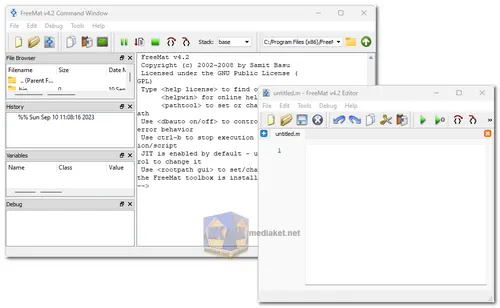FreeMat is an open-source numerical computing environment that provides a powerful platform for scientific and engineering computations. It is designed to be similar to MATLAB in terms of its syntax and functionality, making it a popular choice for users who are familiar with MATLAB but prefer open-source software.
FreeMat is a free and open-source alternative to commercial software like MATLAB. It is actively developed and maintained by a dedicated community of developers. It is available for various platforms, including Windows, macOS, and Linux, making it accessible to a wide range of users.
Here are some FreeMat key features:
- N-dimensional Array Manipulation: FreeMat supports N-dimensional arrays, making it suitable for handling a wide range of data types and structures.
- Data Types: FreeMat supports various data types, including 8, 16, and 32 bit integer types (signed and unsigned), 32 and 64 bit floating-point types, and 64 and 128 bit complex types.
- Arithmetic Operations: It provides built-in arithmetic operations for manipulating all supported data types, allowing for efficient data processing and computation.
- Linear Equation Solving: FreeMat supports the solution of linear systems of equations through the divide operators, which is a critical feature for many engineering and scientific applications.
- Matrix Decompositions: It includes functionality for eigenvalue and singular value decompositions, important for tasks like eigenvalue problems and singular value decomposition.
- Control Structures: FreeMat offers full control structure support, including for-loops, while-loops, break, continue, and other control flow statements.
- 2D Plotting and Image Display: Users can create 2D plots and display images, aiding in data visualization and analysis.
- Heterogeneous Array Types: FreeMat supports heterogeneous array types, often referred to as "cell arrays" in MATLAB, allowing for versatile data structures.
- Dynamic Structure Arrays: It provides full support for dynamic structure arrays, which are essential for organizing and managing data.
- FFT Support: FreeMat offers split-radix based Fast Fourier Transform (FFT) support, useful for frequency domain analysis.
- Pass-by-Reference: Similar to an IDL feature, FreeMat supports pass-by-reference, which is valuable for efficient memory management and data handling.
- Keyword Support: Another feature from IDL, FreeMat supports keywords in function calls, enhancing code readability and flexibility.
- Interface to External Code: FreeMat allows for a codeless interface to external C/C++/FORTRAN code, enabling users to integrate existing code libraries seamlessly.
- Native Windows Support: It natively supports Windows, ensuring a smooth experience for Windows users without the need for additional software.
- Sparse Matrix Support: FreeMat offers native support for sparse matrices, which can significantly optimize memory usage and computational efficiency for certain applications.
- Support for Mac OS X: FreeMat provides native support for Mac OS X, eliminating the need for an X11 server.
- Function Pointers: It supports function pointers, enabling dynamic function invocation and advanced programming techniques.
- Classes and Operator Overloading: FreeMat supports object-oriented programming concepts, including classes and operator overloading.
- 3D Plotting and Visualization: Users can create 3D plots and visualize data using OpenGL, enhancing the presentation of 3D data.
- Handle-Based Graphics: FreeMat supports handle-based graphics, allowing for more interactive and flexible graphical interfaces.
- 3D Volume Rendering: It offers 3D volume rendering capabilities via VTK (Visualization Toolkit), useful for visualizing complex 3D data sets.
Here are advantages of using FreeMat:
- Cost-Free: As an open-source software, FreeMat is completely free to use, making it an attractive option for individuals, researchers, and organizations with budget constraints.
- Cross-Platform: FreeMat is available for multiple operating systems, ensuring compatibility across Windows, macOS, and Linux environments.
- MATLAB Compatibility: The MATLAB-like syntax and compatibility make it easy for MATLAB users to migrate to FreeMat without a steep learning curve.
- Libre/Open Source: Being open-source, FreeMat provides transparency, allowing users to inspect and modify its source code as needed, which can be valuable for research and customization.
- Wide Range of Functions: FreeMat offers a comprehensive set of mathematical and scientific functions, making it suitable for a broad spectrum of computational tasks.
- Customization: Users can create custom functions and toolboxes, tailoring FreeMat to their specific needs and applications.
In summary, FreeMat is a feature-rich open-source environment that excels in rapid engineering and scientific prototyping, data processing, and visualization. Its compatibility with MATLAB and IDL, combined with its extensive feature set, makes it a powerful choice for scientific and engineering applications while remaining accessible to a wide user base due to its open-source nature.
FreeMat - Changelog:
- FreeMat is now easier to build. The top level README.TXT includes instructions on how to build FreeMat on all three platforms (Linux, Mac OS X, and Mingw32).
- Documentation has been migrated to doxygen.
- A number of improvements have been made to the JIT back end.
- 64-bit on all platforms!

